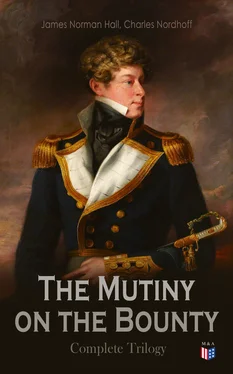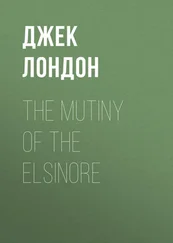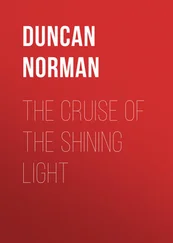The men walking along the shelf of reef at the base of the cliffs were too far away for inspection, but they seemed fine stout fellows, taller than Englishmen. They were dressed in girdles of bark cloth which shone with a dazzling whiteness in the morning sunlight. They were naked except for these girdles, and they laughed and shouted to one another as they followed us along, clambering with great agility over the rocks.
As we rounded the northern end of the island, Smith hailed me from the top. “Look, Mr. Byam!” he shouted, pointing ahead eagerly. There, many leagues away, I saw the outlines of a mighty mountain rising from the sea,—sweeping ridges falling away symmetrically from a tall central peak,—all pale blue and ghostly in the morning light.
The breeze was making up now, and the Bounty, heeling a little on the larboard tack, was leaving a broad white wake. When I reached the deck I found Mr. Bligh in a rarely pleasant mood. I bade him good morning, standing to leeward of him on the quarter-deck, and he saluted me with a clap on the back.
“There it is, young man,” he said, pointing to the high ghostly outlines of the land ahead. “Tahiti! We have made a long passage of it, a long hard passage, but, by God, there is the island at last!”
“It looks a beautiful island, sir,” I remarked.
“Indeed it is—none more so. Captain Cook loved it only next to England; were I an old man, with my work done and no family at home, I should ask nothing better than to end my days under its palms! And you will find the people as friendly and hospitable as the land they inhabit. Aye—and some of the Indian girls as beautiful. We have come a long way to visit them! Last night I was computing the distance we have run by log since leaving England. To-morrow morning, when we drop anchor in Matavai Bay, we shall have sailed more than twenty-seven thousand miles!”
Since that morning, so many years ago, I have sailed all the seas of the world and visited most of the islands in them, including the West Indies, and the Asiatic Archipelago. But of all the islands I have seen, none approaches Tahiti in loveliness.
As we drew nearer to the land, with the rising sun behind us, there was not a man on board the Bounty who did not gaze ahead with emotions that differed in each case, no doubt, but in which awe and wonder played a part. But I am wrong—there was one. Toward six bells, when we were only a few miles off the southern extremity of the island, Old Bacchus came stumping on deck. Standing by the mizzenmast, with a hand on a swivel-stock, he stared indifferently for a moment at the wooded precipices, the waterfalls and sharp green peaks, now abeam of the ship. Then he shrugged his shoulders.
“They’re all the same,” he remarked indifferently. “When you’ve seen one island in the tropics, you’ve seen the lot.”
The surgeon went stumping to the ladderway, and, as he disappeared, Mr. Nelson ceased his pacing of the deck to stand at my side. The botanist was a believer in exercise and kept his muscles hard and his colour fresh by walking two or three miles on deck each morning the weather permitted.
“Well, Byam,” he remarked, “I’m glad to be back! Many a time, since my voyage with Captain Cook, I’ve dreamed of revisiting Tahiti, without the faintest hope that the dream might come true. Yet here we are! I can scarcely wait to set foot on shore!”
We were skirting the windward coast of Taiarapu, the richest and loveliest part of the island, and I could not take my eyes off the land. In the foreground, a mile or more offshore, a reef of coral broke the roll of the sea, and the calm waters of the lagoon inside formed a highway on which the Indians travel back and forth in their canoes. Behind the inner beach was the narrow belt of flat land where the rustic dwellings of the people were scattered picturesquely among their neat plantations of the ava and the cloth plant, shaded by groves of breadfruit and coconut. In the background were the mountains—rising fantastically in turrets, spires, and precipices, wooded to their very tops. Innumerable waterfalls plunged over the cliffs and hung like suspended threads of silver, many of them a thousand feet or more in height and visible at a great distance against the background of dark green. Seen for the first time by European eyes, this coast is like nothing else on our workaday planet; a landscape, rather, of some fantastic dream.
Nelson was pointing ahead to a break in the line of reef. “Captain Cook nearly lost his ship yonder,” he said, “when the current set him on the reef during a calm. One of his anchors lies there to this day—there where the sea breaks high. I know this part of the island well. As you can see, Tahiti is made up of two lands, connected by the low isthmus the Indians call Taravao. This before us is the lesser, called Taiarapu or Tahiti Iti; the great island yonder they call Tahiti Nui. Vehiatua is the king of the smaller one—the most powerful of the Indian princes. His realm is richer and more populous than those of his rivals.”
All through the afternoon we skirted the land, passing the low isthmus between the two islands, coasting the rich verdant districts of Faaone and Hitiaa, and toward evening, as the light breeze died away, moving slowly along the rock-bound coast of Tiarei, where the reef ends and the sea thunders at the base of cliffs.
There was little sleeping aboard the Bounty that night. The ship lay becalmed about a league off the mouth of the great valley of Papenoo, and the faint land breeze, wandering down from the heights of the interior, and out to sea, brought with it the sweet smell of the land and of growing things. We sniffed it eagerly, our noses grown keen from the long months at sea, detecting the scent of strange flowers, of wood smoke, and of Mother Earth herself—sweetest of all smells to a sailor. The sufferers from scurvy, breathing deep of the land breeze, seemed to draw in new life; their apathy and silence left them as they spoke eagerly of the fruits they hoped to eat on the morrow, fruits they craved as a man dying of thirst craves water.
We sighted Eimeo a little before sunset: the small lofty island which lies to the west of Tahiti, four leagues distant. The sun went down over the spires and pinnacles of Eimeo’s sky line, and was followed into the sea by the thin golden crescent of the new moon. There is little twilight in these latitudes and, almost immediately it seemed to me, the stars came out in a cloudless dome of sky. One great planet, low in the west, sent a shimmering track of light over the sea. I saw the Cross and the Magellanic Clouds in the south, and constellations unknown to dwellers in the Northern Hemisphere, all close and warm and golden against the black sky. A faint burst of song came from the surgeon’s cabin below, where he was carousing with Peckover; every other man on the ship, I believe, was on deck.
All along shore we could see the flare of innumerable torches, where the Indians went about their fishing or traveled from house to house along the beach. The men of the Bounty stood by the bulwarks or on the booms, speaking in low voices and gazing toward the dark loom of the land. A change seemed to come over all of us that night: all unhappiness, all discontent, seemed banished, giving way to a tranquil content and the happiest anticipation of what the morrow would bring. Mr. Bligh himself, walking the deck with Christian, was rarely affable; as they passed me from time to time I overheard snatches of his talk: “Not a bad voyage, eh? ... Only four down with scurvy, and we’ll have them right in a week ashore.... The ship’s sound as a walnut.... Bad anchorage.... We’ll soon shift out of Matavai Bay.... A fine place for refreshments....”
I was in the master’s watch, and toward midnight Mr. Fryer chanced to notice me stifling a yawn, for it was many hours since I had slept.
Читать дальше











